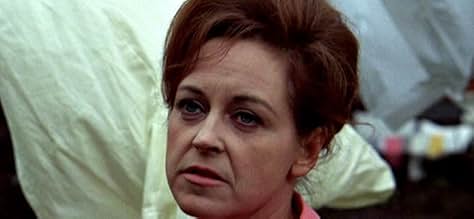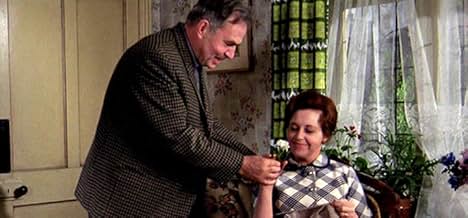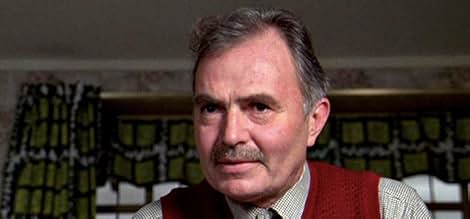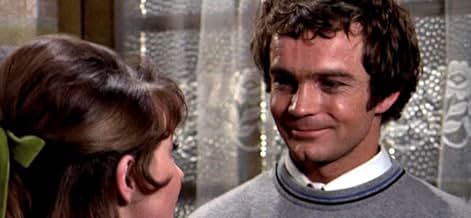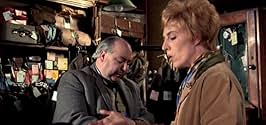AVALIAÇÃO DA IMDb
7,0/10
1,1 mil
SUA AVALIAÇÃO
Adicionar um enredo no seu idiomaA stern father and lenient mother try to deal with the ups and downs of their four children's lives in working-class Bolton.A stern father and lenient mother try to deal with the ups and downs of their four children's lives in working-class Bolton.A stern father and lenient mother try to deal with the ups and downs of their four children's lives in working-class Bolton.
Reginald Green
- Bowler 1
- (as Reg Green)
Avaliações em destaque
Outside the household is a different world and the family struggle to tread the line between Dads authority and their hopes and dreams.
The period is captured; The bakelite light swithes, the Georgian floorpan, the picture rails, the wall paper, the short skirts, the cheeky lads, the Mini van, shiny modern mangles....
The location is captured; A wind lashed glacier hewn rocky landscape, walls of local stone, community, freedom.
But there is much much more; Childhood, happiness, sensuality, pride, values, freedom, authority, rebellion, violence (in the deepest sense), love, struggle, puberty, naivety, morality, trust, faith, deceit, machismo, manners, maturity, loss, poverty, sacrifice, horror, acceptence, revelation, comedy and parenthood are all there. (And in no particular order!).
This film is a richly woven expression of family tensions that are as relevent today as ever. The fact that some of these aren't tackled directly is testament in itself to the attitudes of the day but the fact that they are all here is a testament to the acting skill, the story and the direction.
If there's anything bad about this film, it's that all this deeply entrenched and wonderfully enacted tension is swept away a little too lightly towards the end. Maybe I missunderstand - the doom and gloom felt by many teenagers really does disappear if they deal with it (**) - maybe the film is trying to send even that message too - well worth doing.
What is the film trying to say? Kids: Parents were young too, parents struggle too, everyone makes mistakes, everyone learns, things change, struggle can end happily. Parents: Don't try too hard! Try to remember that your support is the key to their well being.
It sounds simplistic doesn't it? Sometimes the film feels like that too but it's then that you notice how much is being being challenged and uncovered.
The film is a classic.
(**) - Not the problems themsleves.
The period is captured; The bakelite light swithes, the Georgian floorpan, the picture rails, the wall paper, the short skirts, the cheeky lads, the Mini van, shiny modern mangles....
The location is captured; A wind lashed glacier hewn rocky landscape, walls of local stone, community, freedom.
But there is much much more; Childhood, happiness, sensuality, pride, values, freedom, authority, rebellion, violence (in the deepest sense), love, struggle, puberty, naivety, morality, trust, faith, deceit, machismo, manners, maturity, loss, poverty, sacrifice, horror, acceptence, revelation, comedy and parenthood are all there. (And in no particular order!).
This film is a richly woven expression of family tensions that are as relevent today as ever. The fact that some of these aren't tackled directly is testament in itself to the attitudes of the day but the fact that they are all here is a testament to the acting skill, the story and the direction.
If there's anything bad about this film, it's that all this deeply entrenched and wonderfully enacted tension is swept away a little too lightly towards the end. Maybe I missunderstand - the doom and gloom felt by many teenagers really does disappear if they deal with it (**) - maybe the film is trying to send even that message too - well worth doing.
What is the film trying to say? Kids: Parents were young too, parents struggle too, everyone makes mistakes, everyone learns, things change, struggle can end happily. Parents: Don't try too hard! Try to remember that your support is the key to their well being.
It sounds simplistic doesn't it? Sometimes the film feels like that too but it's then that you notice how much is being being challenged and uncovered.
The film is a classic.
(**) - Not the problems themsleves.
This is an excellent film about a traditional working class family in Northern England. Filmed on location in Bolton, it stars James Mason as the father who is the dominant force within his home. Or so it seems. Cleverly, the film, based on the play, portrays the complexities of family life. The supporting cast is terrific as well, with many familiar faces lending support.
I have watched this film many times, and it always seems to get better. With great acting performance by James Mason, and the cast of this classic English film. If you have not seen it before, then I highly recommend that you do.
No matter what mood I'm in, this film always sorts me out. I can't count the times I've watched it, at any time of the day or night. It is the most basic of love stories, showing that the ties that bind a family are often stretched to the limit, but cannot be broken. I have over 500 films in my collection and I don't think there's a more romantic moment in any, than when James Mason takes of his jacket and puts is round Diana Coupland's shoulders. I remember feeling the tenderness of that moment when I first saw the film in the cinema as a young teenager and now I am 50 and it still makes me shiver. There's never been another film which comes anywhere near it. My old video is just about played out and I've copied it on to DVD, but I would love to know if anyone has ever seen it for sale on DVD.
'Ee, it were right grim up north, especially if your dad was James Mason's Rafe Crompton, who the minute he enters the family home after putting in a shift at the local mill in Bolton, Lancashire, runs the roost with one hand on his wife's housekeeping money and the other on the Holy Bible. Diana Coup!and, later to play a similar part in a comedic manner opposite Sid James in the popular TV sitcom "Bless This House", is his adoring, but fearful wife who tries to keep the peace between father's draconian ways and their rebellious brood of four fast-growing children, all crammed under the one roof. He calls her "mother" and she calls him "father" which is enough to tell you the hierarchical rules of this particular household, but rebellion is in the air in the form of younger daughter Susan George, a free-spirit who duly picks her moment over a portion of herring put down before her at the family evening meal to at last revolt against the old man's outdated ways.
This sets off a chain reaction amongst the rest of the family as one by one they all, in their own ways, join in the revolution with old man Crompton standing his ground until the pressure finally tells on his wife at last forcing him to re-evaluate both himself and his draconian methods as head of the house.
While the ending is somewhat contrived and sentimental, betraying its origins as a stage play of the time, there's still much to enjoy here. The exterior shots of Bolton in the late 60's will strike a nostalgic chord with many of a certain age-group, to whom it will no doubt evoke memories of Dvorak's New World Symphony / Hovis advert, as well as recollections of the generation gap battles enacted here.
There are some frank dialogue exchanges, which while no doubt familiar in living rooms up and down the country are unlikely to have been heard much on the cinema screen.
Mason effects a fine Northerner's accent as the unyielding father figure while Coupland offers credible support as the recognisable "'er indoors", who with a mother's instinct, sees more than her husband and who gets caught in the crossfire. George is good too as the catalyst for change as are other recognisable faces from TV of the time, such as Rodney Bewes, Hannah Gordon and Frank Windsor.
As indicated, for dramatic purposes, I'd have probably preferred a darker ending but in the end my growing affection for the individual characters made me content with the "all's well that bloody ends well" conclusion presented instead.
This sets off a chain reaction amongst the rest of the family as one by one they all, in their own ways, join in the revolution with old man Crompton standing his ground until the pressure finally tells on his wife at last forcing him to re-evaluate both himself and his draconian methods as head of the house.
While the ending is somewhat contrived and sentimental, betraying its origins as a stage play of the time, there's still much to enjoy here. The exterior shots of Bolton in the late 60's will strike a nostalgic chord with many of a certain age-group, to whom it will no doubt evoke memories of Dvorak's New World Symphony / Hovis advert, as well as recollections of the generation gap battles enacted here.
There are some frank dialogue exchanges, which while no doubt familiar in living rooms up and down the country are unlikely to have been heard much on the cinema screen.
Mason effects a fine Northerner's accent as the unyielding father figure while Coupland offers credible support as the recognisable "'er indoors", who with a mother's instinct, sees more than her husband and who gets caught in the crossfire. George is good too as the catalyst for change as are other recognisable faces from TV of the time, such as Rodney Bewes, Hannah Gordon and Frank Windsor.
As indicated, for dramatic purposes, I'd have probably preferred a darker ending but in the end my growing affection for the individual characters made me content with the "all's well that bloody ends well" conclusion presented instead.
Você sabia?
- CuriosidadesWhen Arthur accidentally drives into the back of a car at the traffic lights (while kissing Florence), the driver of the car in front is the film's producer, Michael Medwin.
- Erros de gravaçãoThe first scenes are on a Friday evening after work. However, later when Rafe goes to play bowls, it is a bright, sunny day with the shadows suggesting it was shot around mid-day.
- Citações
Rafe Crompton: There's no father alive who doesn't long to escape his captivity every now and then...
- ConexõesEdited into Northern Soul (2014)
Principais escolhas
Faça login para avaliar e ver a lista de recomendações personalizadas
- How long is Spring and Port Wine?Fornecido pela Alexa
Detalhes
- Data de lançamento
- País de origem
- Idioma
- Também conhecido como
- Spring and Port Wine
- Locações de filme
- Sunnyside Mill, Bolton, Greater Manchester, Inglaterra, Reino Unido(was on Adelaide St., now demolished)
- Empresa de produção
- Consulte mais créditos da empresa na IMDbPro
Bilheteria
- Orçamento
- £ 198.000 (estimativa)
- Tempo de duração1 hora 41 minutos
- Mixagem de som
Contribua para esta página
Sugerir uma alteração ou adicionar conteúdo ausente

Principal brecha
By what name was Tirania de Pai (1970) officially released in Canada in English?
Responda

